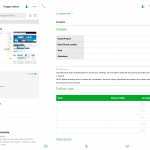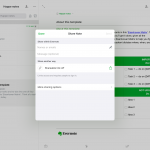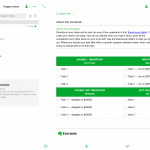Evernote is an intuitive note taking app that has many applications. Users can generate shareable notes that include typed text, drawings, audio and images. Users can tag and favorite their notes to make them easier to search for later; they can also be organized in notebooks to keep related notes together. Evernote could be used to create case studies, take course notes, or to curate content for a course.
Version: iOS 8.24.6.3
Compatibility: iOS, Android, Web Browser
Price: Free and Premium Versions ($7.99 a month)
Target Audience: Educators and Students looking for a way to keep detailed notes or share content.
Bottom Line: Evernote is a note taking app that can be used for a variety of learning activities including creating course notes, creating case examples, or creating journals.
Likes |
Dislikes |
|
|
Features and Options:
Evernote is a note taking app that is known for its versatility and options. Users have the option to create multiple notebooks so that they can create separate books for different classes, projects, or groups. These notebooks can then be shared with and edited by other users.
In each notebook, users can create notes using typed text, or they can write or draw images using a stylus. There are also options to add different types of media, including images from the device’s camera, recorded audio from the devices microphone, or external files such as a .pdf.
With each note there are also options to use pre-generated templates. The templates provide options for quickly creating to-do lists, checklists, planners, course notes, and goal trackers. Once a note is created, a user can generate key words for each note or favorite a note so that it can be easily found later. The free version allows users to sync their data over two devices and allows for 60MB worth of uploads per month. The paid version allows users to sync their data across an unlimited number of devices and upload 10GB of data a month. Both options give access to Evernote through iOS, android, or a web browser, there are also desktop apps for both PC and Mac.
Practice Implications:
Evernote could be integrated into courses to support many types of learning activities. An instructor may use Evernote to create a detailed hypothetical case study for their students, including information about a hypothetical client, case notes, interviews and images of the client’s home or work environment. They could share these notes with students and have them analyze the client’s situation and recommend interventions. The case study could be updated with new information or events over the course of the semester and students could comment and think critically in response to the new information.
Evernote could also be used to have students generate a shared knowledge base for the class. Students could add individual class notes, information from outside research assignments and interviews with outside experts. The information would then be curated and shared over the course of the semester. This would allow students to become actively engaged in creating the content the course covers.
Evernote would also be a good tool to have students create personal journals or use for reflection exercises over the course of a semester. Students could share these journals with the instructor for feedback and additional guidance.






